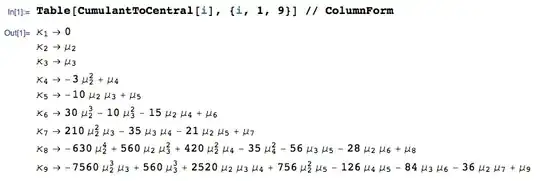Question asks: "is the $n$th cumulant equivalent to the $n$th central moment (i.e. about the mean)?"
Answer is: only for $n = 1, 2$ or $3$.
Here, for example, are the first 9 cumulants of the population in terms of central moments $\mu_i$ of the population:

using mathStatica's CumulantToCentral function.
More generally
In a multivariate world, the product cumulant will only be identical to the product central moments if 1 < (sum of the indexes) $\le$ 3. For example, $\kappa_{i,j,k}$ will be equal to $\mu_{i,j,k}$ provided $1 < i+j+k \le 3$. Here are some bivariate product cumulants expressed in terms of product central moments of the population:


